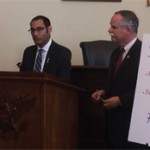There is another area where I can see the progress our advocacy is making. It’s an area near to my heart, in particular because of my time as president of the ACR Research and Education Foundation. Federal funding for research is something we have to continue to push because of the precarious budget situation in Washington, D.C., and the crucial difference funding can make in the lives of patients—and members of Congress are getting the message. I can tell you that, in my meetings on Capitol Hill, after the members or staffers tell us that, yes, they know, they’re going to get rid of the SGR, usually the second item they will bring up—sometimes before I get to it—is that they support research. In fact, we are hearing nearly universal support for medical research—we just need to make sure they follow through with the dollars. Usually there are caveats and recognitions about the budget situation in Washington, but the message about research funding is crystal clear.
However, it is not just talk or telling us what we want to hear. While partisan politics and the competition between the parties, each controlling its own chamber of Congress, has resulted in deadlocks and bad deals between the Senate and House, and in an environment where cuts in funding are the norm, members of Congress consistently propose either keeping NIH funding steady or providing increases—not cuts. Why? Because it’s the right thing to do for patients and for keeping the U.S. at the forefront of cutting-edge research? Yes, of course. But, just as in the cases of the two issues we heard about that morning at the Capitol, it also has a lot to do with the fact that they have been asked by advocates and constituents to take that stance.
We are advocates because advocacy works. When your colleagues were in Washington this month at Advocates for Arthritis, or when you participated in the virtual Advocates outreach to your members of Congress, or when you reach out to your representatives in Washington or at their home office at any point during the year, you will know that we are making a difference.
It was especially gratifying in May to have so many of the elected officials or staffers identify us by our ubiquitous forks—they are starting to know who and what rheumatologists are. Let’s be proud of what we have accomplished and commit to staying involved so we can make even more progress together for our profession and our patients. If we build the relationships, and take thoughtful and credible positions on issues that are important for our patients—Congress’s constituents—we will continue to make a difference. So put on that fork—there is no time like today and there is no year like this year for advocacy!
